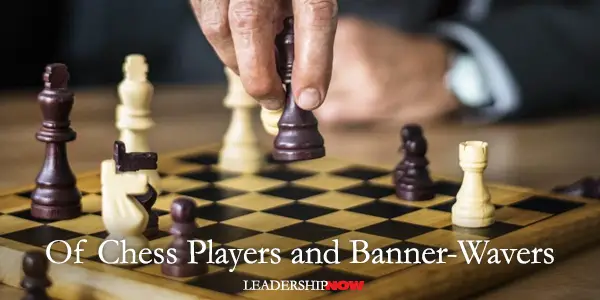Of Chess Players and Banner-Wavers

“It’s a great huge game of chess that’s being played—all over the world—if this is the world at all, you know.”
—Lewis Carroll, Alice in Wonderland
Dimitri K. Simes and Paul J. Saunders explained in The National Interest, why America needs chess players—not banner-wavers. “We have increasingly lost the ability to look squarely in the mirror before judging others and taking them to task.”
American leaders have taken their own share of ruthless, and even brutal, decisions….Such decisions, while obviously regrettable, were the result of the types of difficult choices that great powers must often make. But then it behooves us not to preach too loudly about our own sense of morality. It also means that, in crafting an effective foreign policy, we shouldn’t be blinded by our own rhetorical claims to ethical perfection—or to fail to recognize that many states see us as a “normal country”—one that pursues its own interests by any means necessary and often makes moral judgments about others that appear influenced by those interests.
Supporting one’s friends while condemning one’s opponents is nothing new; but when that is combined with a messianic predisposition to view the world as divided into the children of light and the children of darkness—with no need to compromise with, understand the motives of or address the concerns of those deemed opponents—this becomes truly dangerous. The refusal of most politicians to acknowledge the clear connection between U.S. conduct in the Middle East and the hatred of the United States among Islamist extremists that motivated the September 11 attacks is a case in point. The United States has had serious reasons for pursuing the types of policies it has—but it is foolhardy to ignore the evidence that there are costs. The Arab-Israeli dispute is clearly a key litmus test of American policy for many Muslims—but this fact has not been a subject of discussion, even after being raised in the Republican presidential debates. And while plenty of experts on the region have made this argument, it is not reflected where it counts: among political leaders or even most of the mainstream media.
 It is an interesting observation and points to a trap for leaders when they fall prey to grand delusions. One author comments that there is the “desire of some men to become savior-gods and the proclivity of people to move toward them and support them, thereby giving legitimacy to their rule and encouragement to their fantasies of omnipotence. Those who pretend at godhood, or who simply use it as a political device, often claim for themselves a unique anointing, the status of superman, or the ability to create supreme law. In their delusions, they become mistaken messiahs.”
It is an interesting observation and points to a trap for leaders when they fall prey to grand delusions. One author comments that there is the “desire of some men to become savior-gods and the proclivity of people to move toward them and support them, thereby giving legitimacy to their rule and encouragement to their fantasies of omnipotence. Those who pretend at godhood, or who simply use it as a political device, often claim for themselves a unique anointing, the status of superman, or the ability to create supreme law. In their delusions, they become mistaken messiahs.”
* * *

Like us on
Instagram and
Facebook for additional leadership and personal development ideas.
Posted by Michael McKinney at 07:00 PM
Permalink
| Comments (0)
| This post is about Government
, Leaders









